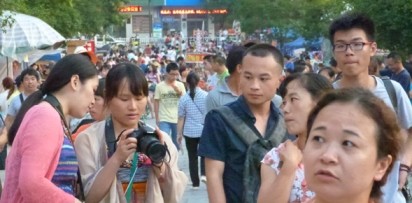Several local tourists have complained of being victims of scams and poor service during the National Day holiday, from Oct. 1 to 7, amid a report by the China National Tourism Administration that the number of visitors increased this year, the China Daily reported.
The report cited a tourist from Nanjing who complained of being overcharged for a seafood dinner in a restaurant in Qingdao City.
The Beijing Youth Daily reported that the tourist, surnamed Zhu, complained that he was charged 1,520 yuan for the prawns because "the price was per prawn." The restaurant owner reportedly threatened to beat his family if he will not pay the bill.
Authorities had now closed the restaurant for business and fined it with 90,000 yuan ($14,000). An official at the market supervision administration in the northern district of Qingdao was also suspended after the incident.
Another tourist from Shenzhen also fell victim to another scam in Lijiang, Yunnan Province. Identified only as Peng, the tourist said he was enticed into spending 5,000 yuan at a bar.
Peng said that he met two women on WeChat, who took him to a bar but they disappeared after ordering six bottles of wine.
The Paper, an online news portal in Shanghai, said that several bars in Lijiang often hire women to bring in tourists. Two bars were reportedly closed for violations in July after an inspection.
Zhang Hui, a veteran tourist in Shanghai, said that she would rather travel overseas than experience the poor service in some tourist destinations.
"When we travel, we have to worry about traps all the time. Taxi drivers detour to charge you more. Tour guides take you to buy fake souvenirs just to get kickbacks. This is awful," said Zhang.
Wang Yanyong, director of the Tourism Development and Planning Research Center of Beijing Jiaotong University, noted that scams become common occurrence during peak tourism season.
"The period for tourism attractions to make profit is way too limited in China," Wang said. "Chinese tourists still rely on public holidays to take trips. Many tourism destinations expect to generate profits during the seven days."
"However, this is no excuse for blackmailing tourists. Now the cost for traveling overseas is very low. Many tourists have experienced good service overseas, and they will not tolerate poor service at home," Wang added.



























